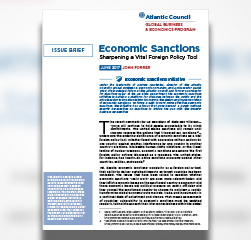 vital foreign policy tool" />
vital foreign policy tool" /> vital foreign policy tool" />
vital foreign policy tool" />
Despite the popularity of economic sanctions as a foreign policy tool, their ability to deliver sustained impacts on target countries is often called into question. In “Economic Sanctions–A Vital Foreign Policy Tool,” author John Forrer, associate research professor of strategic management and public policy at the School of Business at George Washington University, explains the reasons behind sanctions’ enduring popularity. The author argues the most compelling reason for their appeal is that they can be designed and deployed to achieve many foreign policy goals.
According to Forrer, the most typical uses of economic sanctions to achieve foreign policy goals include:
1. Compelling another country to change unwanted policies by inflicting a level of economic suffering for a sufficient duration of time to make retaining the offending policy, including regime change, intolerable.
2. Deterring another country from adopting an unwanted policy in the future by inflicting a level of economic suffering for action(s) already taken commensurate with the grievousness of the action.
3. Denying another country and others access to resources and financing that would be used to advance an unwanted policy or practice.
4. Denying another country access to financial assets that could otherwise be used as reparations for actions of the sanctioned countries.
5. Making a symbolic gesture to diplomatically isolate the sanctioned country but with no expectations that the economic sanctions will impact the unwanted policies.
Yet, Forrer cautions that the issues, which have been raised to question whether economic sanctions “really work,” are even more relevant today. The author lists the following questions as important measuring sticks for sanctions’ effectiveness: Did the sanctions inflict economic losses on the sanctioned country’s economy? Did those economic losses put political pressure on public officials? Did they compel the sanctioned country to change its policies? Forrer adds that a rapidly transforming global economy puts markets, trade, and investments in a continual state of adjustment and change. He concludes that for sanctions to be effective, the design, implementation, and measurement of economic sanctions’ impacts must be properly calibrated to the economic realities of the moment, not the past.
The author points to the election of Donald J. Trump as an opportunity to take a fresh look at ways to make economic sanctions more effective. He suggests that aligning better designed economic sanctions more closely with their foreign policy goals is one promising approach. In addition, the author makes the case that better designed economic sanctions would be even more successful when considered from both the policy and business perspectives. Forrer proposes building stronger public-private partnerships, which can support a more effective implementation of better aligned and well-designed economic sanctions, to sharpen a vital foreign policy tool.
This issue brief is part of the Atlantic Council’s Economic Sanctions Initiative and is made possible by generous support through Hogan Lovells US LLP, PricewaterhouseCoopers US LLP, and David Aufhauser.